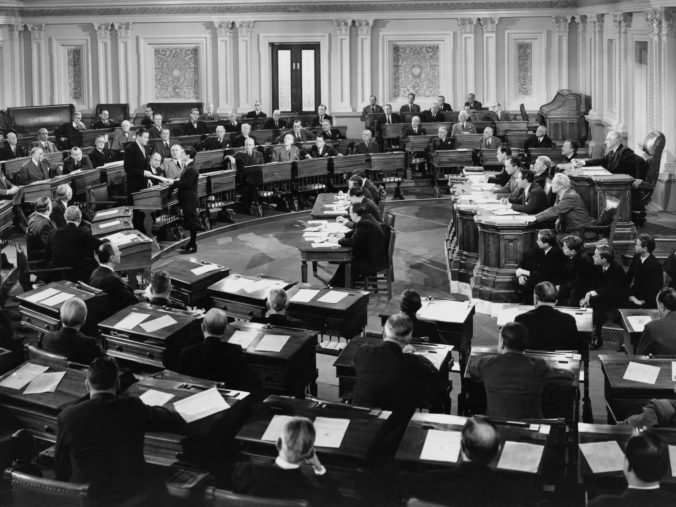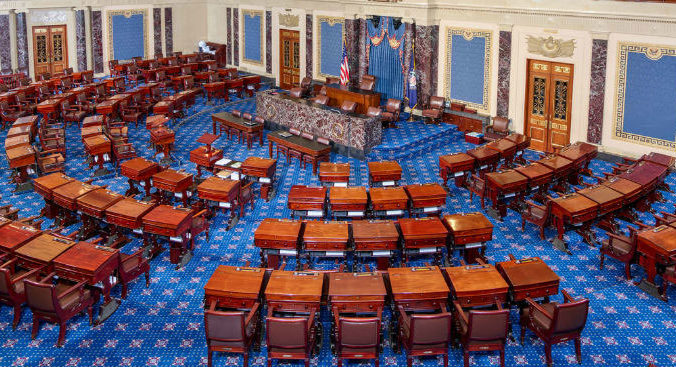LISTEN ON SOUNDCLOUD:
Perhaps the most important advantage of the Senate to the United States was that it would become the repository of our national character, which is explained in Federalist 63. By intention Americans would be able to recognize themselves in the Senate because senators would be of themselves, but because they would be chosen from among the best of us, the Senate would become an example for the nation and the jewel of the American republic.
The Senate was the place, John Adams wrote, where the naturally talented could be gathered and made useful to the country. Nature, he observed, deposits talent at random in all parts of human society, but the practice of the world had been to raise into high places only the favored progeny of the rich and titled. America would put a new and different rule into practice. Rather than frustrating the ambitions and wasting the talents of the naturally gifted, free America would welcome their rise from whatever precinct of American society into which they might be born. Merit and not birth would be the basis for acceptance into high place. Any might enter the Senate with sufficient years of age and citizenship and whose ability had earned the recognition of peers in state government. Because other nations suppressed the rise of natural talent, the talented were alienated, could became dangerous enemies of their own country and had to be watched and sometimes repressed. But because high position in America was open to merit, the government befriended the naturally talented. Gratitude would bind them more closely to country; patriotism would reinforce ambition. For these reasons the members of the Senate in republican America, it was hoped, might even out-perform the best of old-world aristocracies.
The ancient republics that had endured the longest were Carthage, Sparta and Rome, Publius reminds us in Federalist 63. All had senates and the other republics that did not have them, perished. In these senates the unique character of a nation was distilled, developed and emerged as something of the people but better than the people. That refined national character was then transferred back into the people, improving them. For example, the customs of Roman senators were distinctively Roman, but their outstanding conduct refined those customs, which they gave back to the people in better form, as Livy’s History of Rome shows us.
Once, a rare military disaster by a massive army of Gauls left Rome nearly defenseless. Unable to prevent the investiture of the city, the people retreated to higher ground on the Capitol. But many of their old senators chose to remain below in front of their estates, resplendent in their richest clothes, wearing the insignias of their high rank, seated in thrones, waiting to die. When the Gauls entered the city and met them, the splendor and calm of these Romans made them pause. One Gaul stroked the beard of Papirius, who, in return, brought down his ivory staff on the invader’s head. This defiant act broke the charm over the Gauls and precipitated the slaughter. One by one, Livy wrote, the senators calmly met their fate in this dignified pose. All of this was in full view of the people, who thereafter rallied and utterly destroyed the Gauls.
In contrast to the Roman people, Jefferson wrote, the American people were less ferocious and more magnanimous, less harsh and more gentle. We were free and brave without the Roman tendency to oppress. All of those qualities can be found in the proceedings of the American Senate in the nineteenth century, but they are found in a refined shape and form a uniquely American eloquence. As the framers of our Constitution intended, the intelligence and education of those senators rivaled the best in the world but a great many of them began their lives as impoverished of life’s comforts as Lincoln and Jackson were. In those remembered and many forgotten speeches delivered in our Senate during the great crises of bygone times, a literate American cannot fail to see two things; first, our parentage; second, the wellspring of our national pride. We can see ourselves in them and we can see that they are the best of us.
The Senate is one of the few places in America where the individual virtues peculiar to aristocracy were intended to persist and did last for a long time, for the good of the country. When our greatest crisis was tearing our nation in half just before the Civil War, senatorial decorum was preserved, though the differences between the two sides were severe and touched the fundamental principles of our government. In contrast, order was often lost, sometimes approaching bedlam, in the House of Representatives. Upon the commencement of secession, American senators graciously took their leave of each other as friends, like Palamon and Arcite in Two Noble Kinsmen, each knowing that soon they would face off against each other in a struggle to the death. To a thorough democrat, such conduct is madness or stupidity, but in national crisis, these peculiar virtues produce and inspire steadiness and check brutishness. In crisis Americans are famous for forgetting their differences and pulling together, but the Senate was designed to be our natural rallying point. In the members of that body we were meant to see the best of our country, calmly reminding us of who we are as a people, and inspiring us by their example to follow the path of our duty.
Forrest Nabors is Associate Professor of Political Science at the University of Alaska Anchorage and is the author of From Oligarchy to Republicanism: The Great Task of Reconstruction.
Click Here to have the NEWEST essay in this study emailed to your inbox every day at 12:30 pm Eastern!
Click Here for the previous essay.
Click Here for the next essay.
Click Here to view the schedule of topics in our 90 Day Study on Congress.


